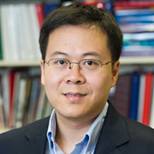

钍基核裂变能全国重点实验室 |
|||
|
-钍基核能物理中心-
|
|||
熔盐机械工程技术部 |
|||
仪控工程技术部 |
|||
熔盐化学工程技术部 |
|||
|
-核能综合利用研究中心-
|
|||
材料研究部 |
|||
钍铀循环化学部 |
|||
应用化学技术部 |
|||
氚科学与工程技术部 |
|||
核与辐射安全技术部 |
|||
应用加速器技术部 |
|||
反应堆运行技术部 |




Curiosity-driven discoveries can often lead to new hypotheses and solutions for solving material problems. I will share a few discoveries from my research group and my classrooms. For example, crumpled paper balls in a wastebasket inspired a new form of ultrafine particles that becomes aggregation-resistant and can disperse in arbitrary solvents. This represents a new way to achieve colloidal processability without the need for tuning surface chemistry. In another example, nanopatterns in Blu-ray movie discs are found to be universally quasi-random, which are suitable for improving the performance of solar cells through light trapping. This suggests a new way to design nanopatterns with the help of information processing algorithms. Finally, I will use a few examples to illustrate how curiosity-driven enquiry enhances learning experience and empowers students to innovate. In one example, a question asked by students after class inspired their creation of sensors from office and toy pencils.

Huang is a Professor of Materials Science and Engineering at Northwestern University. He received his B.S. degree in Chemical Physics from USTC, Ph.D. in chemistry from UCLA, and became a Miller Fellow at UC Berkeley before joining Northwestern in 2007. In research, his group aims to create new knowledge, materials and techniques that are potentially useful. They also use teaching to develop intuition, inspire creativity and bring the best out of students and themselves. His work has been recognized by awards from the National Science Foundation, the Sloan Foundation, the Society of Manufacturing Engineers, the American Vacuum Society, and the International Aerosol Research Assembly. He is included in the lists of Highly Cited Researchers in Chemistry (Thompson Reuters) and Most Cited Researchers in Materials Science and Engineering (Elsevier). He is also a recipient of the Guggenheim Fellowship, the JSPS Fellowship from Japan and the Humboldt Research Award from Germany.